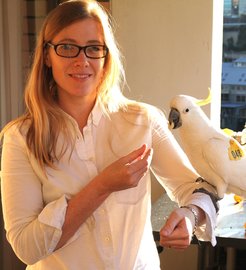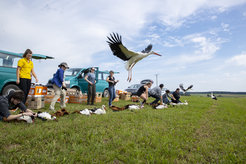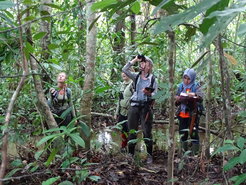Rising Stars
ERC, Emmy Noether, Freigeist—researchers at MPI-AB win the top career-changing awards for scientists in Germany
Early career scientists from the Max Planck Institute of Animal Behavior won a European Research Council Starting Grant, an Emmy Noether Group, and a Volkswagen Freigeist Fellowship in 2021—awards totaling €4 million. The awards are the most prestigious recognition of exceptionally qualified early career researchers in Germany, providing funds to boost research programs and explore high-risk and cutting-edge ideas.
Lucy Aplin, Andrea Flack, and Caroline Schuppli will receive funding for projects on animal culture, the ontogeny of migration, and the evolution of human curiosity, respectively. In addition to funding science, the awards will allow the scientists to expand their research groups and to invest in novel ideas that will break new ground in their discipline.
“These women have been astoundingly successful, winning the most competitive and important, career-changing grants that you can receive at this point in a career,” says MPI-AB Director Meg Crofoot. “The research they will do with these awards is going to push the boundaries of our knowledge, while also propelling each of them towards tenured positions. I find it incredibly hopeful that three women from our institute were recognized in this way. It is testament to their excellence as researchers, but also builds momentum towards a cultural shift where being a woman in science ceases to be remarkable.”
Brainy birds in big cities

Culture was once thought to be uniquely human. But scientists like Lucy Aplin are flipping the script, finding evidence that animals including birds are also cultural creatures, and that such cultures can be key to enabling local adaptative behavior. Her innovative work has been recognized by the European Research Council, which awarded Aplin a Starting Grant in 2021—one of only 397 awarded out of a pool of 4,000 applications across the European Union.
The award, which is the most prestigious for early-career researchers in Europe, offers €1.5 million to support her research on cultural dynamics in changing environments. Aplin will explore this question in an Australian parrot, the sulphur-crested cockatoo, which has successfully colonized cities in Australia. She will examine the rise and spread of urban cultures in cockatoos, and will build ‘cultural landscapes’ to ask how human impact shapes their behavioral repertoires, including comparing urban areas with adjacent forests. Aplin, who is originally from Australia, will collaborate with local researchers at Australian institutions, extending the international reach of the MPI-AB-based project.
“Being awarded the ERC grant feels like amazing validation of my scientific direction—that the ERC believes that it is a novel, interesting, and worth funding,” says Aplin, a Max Planck Research Group Leader (MPRGL) who leads the Cognitive and Cultural Ecology Group at MPI-AB.
“This is the only ERC Starting grant funded this year in the field of Animal Behavior or Behavioral Ecology, so I feel extremely lucky that of all the excellent proposals, the ERC choose to make it my project that they funded. I received fantastic support from MPI-AB during the writing and interview stages, and my MPRGL position gave me the time and freedom that allowed me to develop my initial research program and best formulate my grant proposal.”
Aplin is the second MPI-AB researcher to win the coveted ERC starting Grant. Damien Farine, an associate professor at the University of Zurich, received the 5-year award in 2019 when he was a group leader at MPI-AB. In 2021, Aplin was also selected for a Lise Meitner Fellowship at the Max Planck Institute, which supports tenure-track group-leader positions for female scientists within the Max Planck Society. It allows women to build uniquely supported long-term research programs, and helps to improve the female representation in the Max Planck.
The education of bird migration

Andrea Flack is fascinated by long-distance bird migration, and she’s followed that fascination to explore the unknown stretches of these remarkable journeys. Her research has significantly changed our understanding of how birds migrate, and even pioneered the study of collective migration in the most famous long-distant migrant, the white stork. But the picture is far from complete, she says: “The ontogeny of migration is still missing in our overall understanding of this phenomenon.”
A highly competitive and prestigious Emmy Noether award, which Flack won in 2021, will provide the time and resources to start filling in the missing details. With €1.5 million over 6 years, Flack will explore the various factors influencing the development of migration routes and schedules in white storks.
Specifically, the award will support Flack in extending her past research, which focused on observing birds in the field using tracking devices, towards an experimental approach. With funding for PhD students and tracking devices, Flack will translocate storks into novel environments to explore how they make migratory decisions. A combination of high-resolution tracking, experimental approaches, and knowledge from long-term tracking of storks will reveal novel insights into the process of learning to migrate.
“I feel very honored and proud that I was successful with such a prestigious grant,” says Flack, who leads the Collective Migration Group at MPI-AB. “The Emmy Noether award is open across all disciplines. Compared to other research fields, it is generally difficult to obtain these large research grants in the field of animal behavior.”
“I would like to thank the whole Department of Migration and especially Martin Wikelski who has supported me extensively over the last few years. It has been a long process where many people helped. I can also say that I was successful only in the second round. I had submitted an application for an Emmy Noether Group before but it was rejected. But I am also happy that I was persistent and tried again.”
Hunting down the spark of human curiosity

Caroline Schuppli wants to know what sparked human curiosity during our evolution from great apes. Her own curiosity is closer to being satisfied after winning a prestigious Freigeist Fellowship from the Volkswagen Foundation to fund her research into tracing the phylogeny of human curiosity.
Schuppli was one of only nine scientists selected from a pool of 100 applicants in 2021 by the foundation, which awards its Freigeist Fellowships to young scientists embarking on high-risk projects. Providing recipients with up to €2.2 million for up to eight years, the award aims to offer creative minds maximum freedom and a clear time perspective for their research.
Schuppli is a MPRGL and the leader of the Development and Evolution of Cognition Group at the MPI-AB. She is also the director of the SUAQ orangutan research project and, for the last decade, she has studied a population of wild orangutans in Sumatra. Her research focuses on understanding cognitive evolution and development.
With funding from the Freigeist Fellowship, Schuppli seeks to uncover the evolutionary roots of innovativeness by tracing the phylogeny of human curiosity. Her research group plans to investigate the interplay of curiosity, cognition, and skill repertoires in humans and great apes across different settings. The planned projects will explore which immediate factors suppress and trigger curiosity, and which foster its development.
Upon receiving the fellowship, Schuppli said: "I am extremely honored to receive a Volkswagen Foundation Freigeist Fellowship. I am especially excited because the fellowship will allow me to conduct research projects which deviate from mainstream and will as such shed light on novel aspects of my research. This is a unique opportunity which I am looking forward to taking on."














